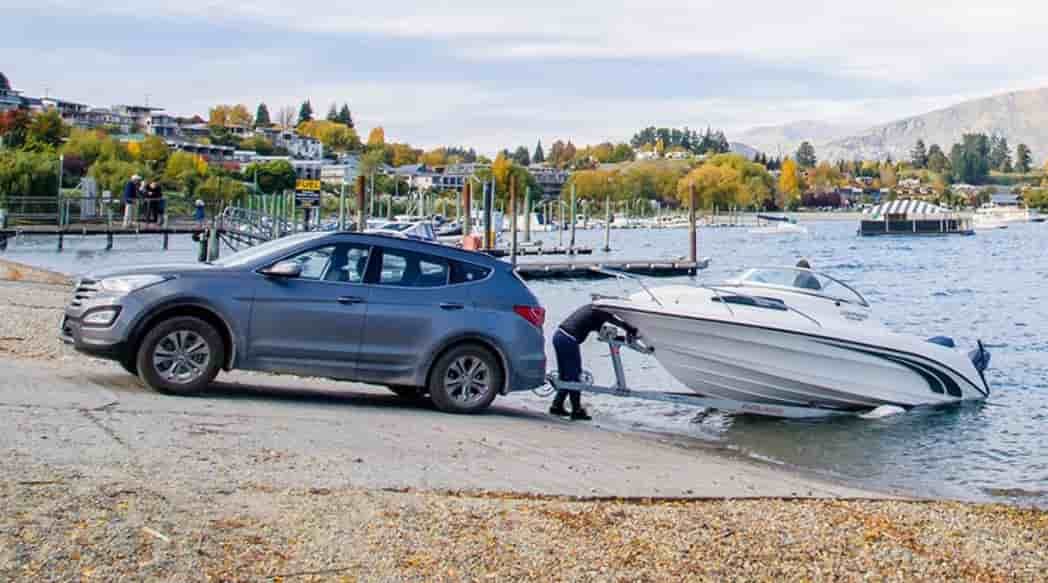Have you ever wondered if your Nissan Rogue can actually tow a boat? It is a common question among drivers who love weekend getaways and water adventures. The Nissan Rogue is known for its stylish design, excellent fuel economy, and smooth handling, but towing a boat adds an entirely new challenge. Understanding what your vehicle can safely tow is not just about convenience, it is about protecting your car, your boat, and everyone on the road.
In this guide, we will uncover the real towing capacity of the Nissan Rogue and explain what kinds of boats it can handle without risking engine or transmission damage. You will also learn how to set up your Rogue for safe towing and the most common mistakes new owners make. Whether you plan to haul a lightweight fishing boat, a small pontoon, or even a jet ski, this article will help you make the right decision before hitting the water.
Understanding the Nissan Rogue’s Towing Capacity
Before you attach a trailer or a boat, it is essential to understand exactly how much your Nissan Rogue can tow. The Rogue is classified as a compact SUV, which means its design focuses more on comfort and efficiency than heavy-duty towing. Still, with the right setup, it can confidently handle small watercraft and lightweight trailers.
Most Nissan Rogue models from recent years, including the 2023 to 2026 versions, have a maximum towing capacity of 1500 pounds (680 kilograms). This limit applies whether you drive the front-wheel-drive or all-wheel-drive configuration. While that may not sound like much compared to larger SUVs or trucks, it is sufficient for smaller boats, jet skis, and lightweight aluminum fishing boats.
Several factors influence how much your Rogue can safely tow. Engine power, torque output, transmission type, and even the cooling system all play key roles in towing performance. Payload weight also matters, since passengers and gear add to the overall strain on the vehicle. Nissan recommends using an approved tow hitch and wiring harness to ensure proper weight distribution and braking response.
Knowing these limits helps prevent common towing problems such as overheating, transmission wear, and unstable handling. Once you respect the vehicle’s capacity and prepare it correctly, the Rogue can be a reliable partner for short-distance towing adventures.
What Kind of Boat Can a Nissan Rogue Tow?
Once you know that the Nissan Rogue can tow up to 1500 pounds, the next question is what kind of boat actually fits within that limit. The answer depends mainly on the boat’s total weight, including the trailer and any additional gear you plan to carry.
Lightweight boats are the best match for the Rogue’s towing ability. Aluminum fishing boats, small Jon boats, and inflatable boats usually weigh between 600 and 1000 pounds, which keeps them well within safe towing range. Even when you add the trailer weight, you will still stay comfortably under the maximum capacity.
The Rogue can also manage personal watercraft such as jet skis or small kayaks. A single jet ski with its trailer typically weighs about 1000 to 1200 pounds, making it an excellent fit for short trips to the lake. Compact pontoon boats made from aluminum may also work if they are on the lighter side and you drive on flat roads.
However, larger fiberglass boats or speedboats are too heavy for the Rogue to tow safely. These types often exceed 2500 pounds and require a stronger SUV or pickup truck. Overloading your vehicle not only strains the transmission and brakes but also increases the risk of losing control while driving.
If you stay within the Rogue’s towing limits and choose a lightweight boat, you can enjoy stress-free adventures every weekend without worrying about damaging your SUV.
The Limits and Risks of Towing with a Compact SUV
While the Nissan Rogue is capable of towing light loads, it is important to remember that this vehicle was never designed for heavy-duty towing. As a compact SUV, it prioritizes comfort, fuel efficiency, and everyday driving over raw pulling power. When you push it beyond its limits, problems can occur quickly.
One of the main risks of towing too much weight is excessive strain on the transmission. The Rogue’s continuously variable transmission (CVT) is smooth and efficient under normal conditions but can overheat or wear down faster when overloaded. This not only reduces performance but can also lead to expensive repairs.
Braking is another major concern. The heavier the trailer, the longer it takes to stop. Without a proper brake controller or balanced load, the trailer can sway or push the vehicle forward, especially on downhill slopes. Steering stability may also decrease, making the car feel less responsive.
Fuel consumption rises noticeably when towing near the maximum capacity, and the engine works harder to maintain speed. Over time, this extra stress can shorten the vehicle’s lifespan. For these reasons, experts recommend towing no more than 80 percent of the rated capacity for consistent safety and reliability.
Understanding these limitations allows you to tow confidently without risking damage or compromising safety for yourself and others on the road.
How to Set Up Your Nissan Rogue for Safe Towing
Setting up your Nissan Rogue correctly is the key to safe and stress-free towing. Even though the Rogue is not built for heavy loads, a proper setup can make a big difference in stability, braking, and comfort while driving.
The first step is to install a Class I or Class II tow hitch rated for at least 1500 pounds. Make sure it is installed by a professional or at a certified Nissan service center. A factory-approved hitch ensures proper fitment and helps distribute the trailer’s weight evenly across the chassis.
Next, you need a wiring harness that connects the trailer’s brake lights and turn signals to your Rogue. This not only keeps you visible on the road but is also required by law in most regions. Before towing, check that all lights work properly and that the trailer coupler is securely locked in place.
Pay attention to tire pressure on both your vehicle and trailer. Underinflated tires reduce stability and braking control. Always load your trailer evenly, keeping about 60 percent of the weight toward the front to prevent swaying.
If possible, use towing mirrors for better rear visibility and a transmission cooler if you plan to tow frequently in hot weather or hilly areas. These simple steps can help protect your transmission and engine from overheating.
When everything is properly set up, the Nissan Rogue can tow small boats safely and efficiently, giving you peace of mind during every trip.
Real-World Towing Feedback from Nissan Rogue Owners
Beyond the numbers on paper, real-world experiences from Nissan Rogue owners tell the full story of what this compact SUV can and cannot do when towing a boat. Many drivers report that the Rogue performs surprisingly well with small loads such as jet skis, lightweight fishing boats, or kayaks, especially for short trips around town or to nearby lakes.
On automotive forums and social media groups, owners often mention that the Rogue feels stable when towing under 1200 pounds, provided the trailer is balanced and the hitch is properly installed. Some say the engine maintains decent power on flat highways, but climbing steep hills or driving in strong headwinds can make the CVT transmission work harder than usual.
A few users note that fuel economy drops significantly while towing, sometimes by as much as 20 percent. Others highlight the importance of using sport mode or manual shifting (if available) to maintain better control and reduce transmission strain.
Professional reviewers generally agree that while the Rogue is not a towing champion, it can handle small boats reliably if used within its rated capacity. Owners who prepare correctly, drive cautiously, and perform regular maintenance often report no issues even after several towing seasons.
These real-world experiences confirm one key message: the Nissan Rogue can tow a boat safely, but only if you respect its limits and prepare it the right way.
Tips to Maximize Safety and Vehicle Lifespan When Towing
Towing with a compact SUV like the Nissan Rogue requires more attention to detail than with a full-size truck. Small mistakes can lead to stress on the vehicle, poor handling, or even costly mechanical issues. With the right habits and preparation, however, you can keep both your car and your boat in great shape for years to come.
Before every trip, inspect the basics. Check tire pressure, brake function, and fluid levels, especially engine oil and transmission fluid. Towing generates extra heat, so keeping fluids fresh and at the correct level is essential to prevent overheating. Consider changing your oil more frequently if you tow regularly.
Drive slowly and smoothly, avoiding sudden acceleration or braking. Keep a longer following distance since a trailer increases stopping distance. When descending hills, downshift to a lower gear instead of riding the brakes to maintain control and reduce heat buildup.
After each towing trip, give your Rogue time to cool down and check for signs of strain such as unusual noises or fluid leaks. Clean your trailer hitch and wiring connections to prevent corrosion.
Finally, do not exceed 80 percent of your towing capacity if you plan to tow often. This safety margin keeps your engine, brakes, and transmission under less stress, extending the overall lifespan of your vehicle. By applying these small but powerful habits, you ensure that your Nissan Rogue stays dependable and ready for every adventure.
Conclusion
So, can a Nissan Rogue tow a boat? The answer is yes, but with limits. The Rogue’s towing capacity of 1500 pounds makes it capable of pulling small boats, jet skis, and lightweight fishing craft with confidence. However, understanding its limits is the key to safe and enjoyable towing. This compact SUV was designed for efficiency and comfort, not heavy loads, so preparation and awareness are essential.
When properly equipped with a Class I or Class II hitch, balanced trailer weight, and working lights, the Nissan Rogue can handle weekend adventures without trouble. Always drive cautiously, keep up with maintenance, and avoid pushing the vehicle to its maximum rated capacity for extended periods.
If your boating lifestyle involves larger vessels, it may be worth upgrading to a stronger SUV like the Nissan Pathfinder or a midsize truck. But for casual boating enthusiasts who want versatility and fuel efficiency, the Rogue is a surprisingly capable companion.
Have you tried towing a boat with your Nissan Rogue? Share your experience or tips in the comments below and help other drivers make the best choice for their next outdoor trip.

